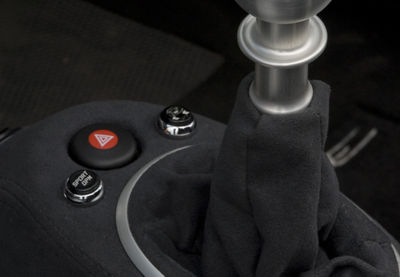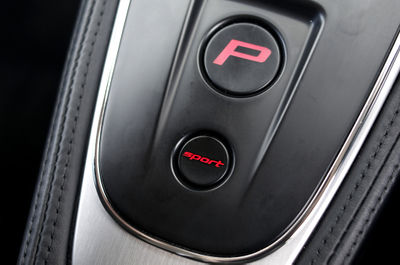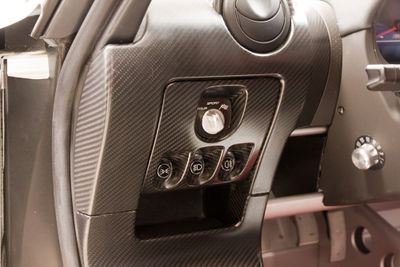Difference between revisions of "Lotus DPM"
m |
|||
| (5 intermediate revisions by the same user not shown) | |||
| Line 1: | Line 1: | ||
{{TOC right}} | {{TOC right}} | ||
Not to be confused with the SELOC meaning for [[DPM]], the Dynamic Performance Management system is Lotus' branding for the cars electronic stability control systems, consisting of: | Not to be confused with the SELOC meaning for [[DPM]], the Dynamic Performance Management system is Lotus' branding for the cars electronic stability control systems, consisting of: | ||
| − | * Corner Brake Control (CBC) | + | * '''Corner Brake Control (CBC)''' - Helps when the car is heavily loaded at the front under partial braking and oversteer comes into play. The system will reduce brake pressure on an inside wheel or increase the braking pressure on the outside front wheel before the car becomes out of shape. |
| − | * Drag Torque Control (DTC) | + | * '''Drag Torque Control (DTC)''' - Lifting too fast off the throttle or a over-aggressive downshifts can lead to the engine braking the wheels too quickly causing slip or oversteer when cornering. This system can apply partial throttle to ensure stability in these situations. |
| − | * Electronic Differential Lock (EDL) | + | * '''Electronic Differential Lock (EDL)''' - If there is a road situation which leads to a wheel with less grip spinning then braking force is applied to this wheel to allow torque to be sent to the other wheel. This means better cornering performance and acceleration on surfaces where one wheel can grip and the other cannot. |
| − | * Traction Control System (TCS) | + | * '''Traction Control System (TCS)''' - Ensures no wheelspin under heavy acceleration. |
| − | * Electronic Stability Control (ESC) | + | * '''Electronic Stability Control (ESC) / Vehicle Dynamic Control (VDC)''' - Applies subtle brake pressure at the required wheel when the car becomes unstable. |
| − | * Anti-lock Braking System (ABS)* | + | * '''Anti-lock Braking System (ABS)*''' - Common system on cars nowadays to reduce brake pressure if available braking torque is more than conditions allow to ensure that the shortest stopping distance possible is attained under all road conditions. |
| − | * Hydraulic Brake Assist (HBA)* | + | * '''Hydraulic Brake Assist (HBA)*''' - Detects emergency braking and increase braking if required to ensure maximum possible braking is used. |
| − | * Electronic Brake Distribution (EBD)* | + | * '''Electronic Brake Distribution (EBD)*''' - Enhances stability by limiting rear brake pressures if the ABS is close to being activated when not required. |
| − | * Understeer Recognition | + | * '''Understeer Recognition''' |
All apart from * can be completely switched off | All apart from * can be completely switched off | ||
| Line 36: | Line 36: | ||
[[image:Exige S DPM Switch.jpg|right|thumb|400px|Exige S (Prototype) DPM Mode Selector]] | [[image:Exige S DPM Switch.jpg|right|thumb|400px|Exige S (Prototype) DPM Mode Selector]] | ||
| + | Unlike the Elise and Evora, the Exige S uses a 3 position rotary switch. The third position, marked with a chequered flag, is used to disable the Lotus DPM assists entirely, and to select Race Mode in cars equipped with the option. | ||
| + | |||
| + | The switch does not stay in the third position and returns to the centre after being selected by twisting and holding the switch - so if the car is restarted it will revert to Sport Mode, not the previously selected Race Mode or DPM Off. This is important to remember as Sport Mode is LESS restrictive than Race Mode. | ||
===Touring Mode=== | ===Touring Mode=== | ||
Touring mode puts all DPM systems in to their fully activated mode and is designed for normal daily driving conditions. | Touring mode puts all DPM systems in to their fully activated mode and is designed for normal daily driving conditions. | ||
| + | |||
| + | '''ABS''': Constant<br /> | ||
| + | '''Max Engine RPM''': 6800rpm<br /> | ||
| + | '''Throttle progression''': Standard<br /> | ||
| + | '''Engine Protection Valve (Exhaust valve) strategy''': EPV opens at high throttle/RPM applications<br /> | ||
| + | '''DPM Characteristics''': Understeer recognition on, managed slip threshold | ||
===Sport Mode=== | ===Sport Mode=== | ||
| − | Sport | + | Sport Mode increases the traction slip thresholds and removes understeer recognition, allowing the driver more vehicle control before an intervention is required. |
| + | |||
| + | '''ABS''': Constant<br /> | ||
| + | '''Max Engine RPM''': 7200rpm<br /> | ||
| + | '''Throttle progression''': Increased response<br /> | ||
| + | '''Engine Protection Valve (Exhaust valve) strategy''': EPV opens from medium throttle applications/engine speeds<br /> | ||
| + | '''DPM Characteristics''': Understeer recognition switched off. Increased slip thresholds and increased yaw angle available | ||
===Race Mode=== | ===Race Mode=== | ||
Only available on cars fitted with optional Race Pack. | Only available on cars fitted with optional Race Pack. | ||
| + | |||
| + | '''ABS''': Constant<br /> | ||
| + | '''Max Engine RPM''': 7200rpm<br /> | ||
| + | '''Throttle progression''': As Sport<br /> | ||
| + | '''Engine Protection Valve (Exhaust valve) strategy''': EPV permanently open<br /> | ||
| + | '''DPM Characteristics''': Understeer recognition switched off. ESP intervention level set high to allow race traction control to function. The traction system learns and calculates available levels of grip and optimises the correct level of torque and EDL intervention to deliver maximum traction to the driver | ||
====Launch Control==== | ====Launch Control==== | ||
| Line 64: | Line 85: | ||
The launch control system can be [http://www.youtube.com/watch?v=W3wnyLqlSsE seen in action on YouTube]. | The launch control system can be [http://www.youtube.com/watch?v=W3wnyLqlSsE seen in action on YouTube]. | ||
| + | |||
| + | ====Off==== | ||
| + | |||
| + | All assists disabled except those related to braking. | ||
| + | |||
| + | '''ABS''': Constant<br /> | ||
| + | '''Max Engine RPM''': 7200rpm<br /> | ||
| + | '''Throttle progression''': As Sport<br /> | ||
| + | '''Engine Protection Valve (Exhaust valve) strategy''': EVP permanently open<br /> | ||
| + | '''DPM Characteristics''': TC.ESP is completely switched off | ||
{{clr}} | {{clr}} | ||
Latest revision as of 08:09, 5 August 2015
Not to be confused with the SELOC meaning for DPM, the Dynamic Performance Management system is Lotus' branding for the cars electronic stability control systems, consisting of:
- Corner Brake Control (CBC) - Helps when the car is heavily loaded at the front under partial braking and oversteer comes into play. The system will reduce brake pressure on an inside wheel or increase the braking pressure on the outside front wheel before the car becomes out of shape.
- Drag Torque Control (DTC) - Lifting too fast off the throttle or a over-aggressive downshifts can lead to the engine braking the wheels too quickly causing slip or oversteer when cornering. This system can apply partial throttle to ensure stability in these situations.
- Electronic Differential Lock (EDL) - If there is a road situation which leads to a wheel with less grip spinning then braking force is applied to this wheel to allow torque to be sent to the other wheel. This means better cornering performance and acceleration on surfaces where one wheel can grip and the other cannot.
- Traction Control System (TCS) - Ensures no wheelspin under heavy acceleration.
- Electronic Stability Control (ESC) / Vehicle Dynamic Control (VDC) - Applies subtle brake pressure at the required wheel when the car becomes unstable.
- Anti-lock Braking System (ABS)* - Common system on cars nowadays to reduce brake pressure if available braking torque is more than conditions allow to ensure that the shortest stopping distance possible is attained under all road conditions.
- Hydraulic Brake Assist (HBA)* - Detects emergency braking and increase braking if required to ensure maximum possible braking is used.
- Electronic Brake Distribution (EBD)* - Enhances stability by limiting rear brake pressures if the ABS is close to being activated when not required.
- Understeer Recognition
All apart from * can be completely switched off
DPM is only found on the Evora (post March 2010 onwards), ZR-series engined Elises (1.6 from September 2011 onwards, MY12 S) and the V6 engined Exige S. Some previous models could be fitted with optional Lotus Traction Control.
Elise
Sport Mode
Only available on cars fitted with optional Sport Pack.
Evora
Sport Mode
Only available on cars fitted with optional Sport Pack (Standard on Evora S).
Exige S
Unlike the Elise and Evora, the Exige S uses a 3 position rotary switch. The third position, marked with a chequered flag, is used to disable the Lotus DPM assists entirely, and to select Race Mode in cars equipped with the option.
The switch does not stay in the third position and returns to the centre after being selected by twisting and holding the switch - so if the car is restarted it will revert to Sport Mode, not the previously selected Race Mode or DPM Off. This is important to remember as Sport Mode is LESS restrictive than Race Mode.
Touring Mode
Touring mode puts all DPM systems in to their fully activated mode and is designed for normal daily driving conditions.
ABS: Constant
Max Engine RPM: 6800rpm
Throttle progression: Standard
Engine Protection Valve (Exhaust valve) strategy: EPV opens at high throttle/RPM applications
DPM Characteristics: Understeer recognition on, managed slip threshold
Sport Mode
Sport Mode increases the traction slip thresholds and removes understeer recognition, allowing the driver more vehicle control before an intervention is required.
ABS: Constant
Max Engine RPM: 7200rpm
Throttle progression: Increased response
Engine Protection Valve (Exhaust valve) strategy: EPV opens from medium throttle applications/engine speeds
DPM Characteristics: Understeer recognition switched off. Increased slip thresholds and increased yaw angle available
Race Mode
Only available on cars fitted with optional Race Pack.
ABS: Constant
Max Engine RPM: 7200rpm
Throttle progression: As Sport
Engine Protection Valve (Exhaust valve) strategy: EPV permanently open
DPM Characteristics: Understeer recognition switched off. ESP intervention level set high to allow race traction control to function. The traction system learns and calculates available levels of grip and optimises the correct level of torque and EDL intervention to deliver maximum traction to the driver
Launch Control
Available only on cars equipped with the Race Pack. Can only be activated when the car is stationary and in Race Mode.
To use launch control the car must be:
- Stationary
- Engine coolant temperature between 80-110c
- Steering wheel in the straight ahead position (a few degrees tolerance allowed)
- Launch control not have been used in the last 2 minutes
- No ECU/ESP fault codes present
- Vehicle has not performed the maximum number of allowed launches (still to be defined)
- Vehicle has covered more than 500 miles as logged by the ECU
The launch control system can be seen in action on YouTube.
Off
All assists disabled except those related to braking.
ABS: Constant
Max Engine RPM: 7200rpm
Throttle progression: As Sport
Engine Protection Valve (Exhaust valve) strategy: EVP permanently open
DPM Characteristics: TC.ESP is completely switched off


